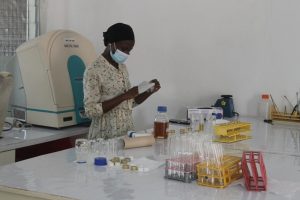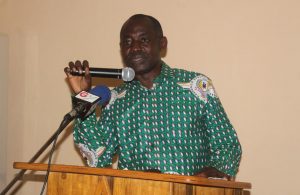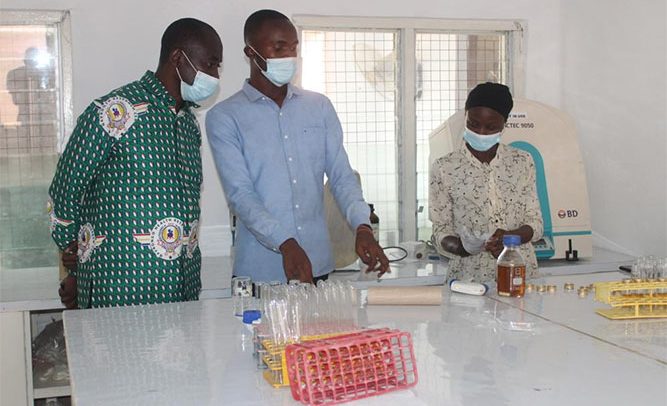Dr. Patrick Odum Ansah, with researches at the lab
The Navrongo Health Research Centre (NHRC) has since its establishment in 1988, as a field site for the Ghana Vitamin A Supplementation Trials (Ghana VAST), contributed significantly to the promotion of the health of deprived communities through research and education.
Located behind the War Memorial Hospital in the Kassena-Nankana Municipal of the Upper East Region, the Center, which is under the Research & Development Division of the Ghana Health Service (GHS), has lived up to the expectation of being a centre of excellence that systematically conducts high quality health and social research to inform policy.
Through the conduct of research into major national and international health problems, the Centre has contributed to the development of the first ever malaria vaccine known as the RTS,S for children who are the most affected by the disease.
Acting Director, Dr. Patrick Odum Ansah, said NHRC has completed six major projects and 13 currently ongoing with the prospects of seven new projects to be included before the end of the year.
He also noted that there has been a total of 29 scientific publications in peer reviewed journals from the centre out of which 8 had first authorship by staff of the centre, 20 are co-authored by staff and one which had a senior member as the last author.
Lassa Fever Trial
The centre will next year begin the first inhuman trials for the rVSV-Vectored Lassa Virus Vaccine.
The trials, will be carried out in the country by the Navrongo Health Research Centre(NHRC) and the Kintampo Health Research Centre (KHRC) following extensive preparations.
Lassa fever is also known as Lassa hemorrhagic fever. The Lassa virus is transferred to humans via contact with food or household items that are contaminated with rat urine or feces, most commonly by the infected Mastomys rodent.
The virus can spread from person-to-person via bodily fluids and causes a range of symptoms including vomiting, swelling of the face, bleeding, and pain in the chest, back and abdomen.
There is currently no approved vaccine that protects against Lassa fever.

A researcher in one of the NHRC laboratories
Dr. Ansah said although Ghana has not witnessed any major Lassa fever outbreak, there could be one in the next 15 years considering the country’s proximity to affected countries like Burkina Faso.
He further explained that the country was chosen for the trial because the vaccine had to be tested in a population that has not recorded any case of Lassa fever.
First-In-human (Phase 1) Trials
First-in-human trials are a type of clinical trial in which a new drug, procedure, or treatment is tested in humans for the first time. The studies take place after the new treatment has been tested in laboratory and animal studies and are usually done as phase I clinical trials.
Dr. Ansah said a few people would be enrolled for the exercise and would be administered small doses of the Lassa fever vaccine, since the aim of the trials is to test the safety and tolerability of the vaccine in human population.
He said after phase 1 trials, the vaccine would go through the phase 2 and phase 3 in a country where Lassa fever disease has been reported, before it would be certified for mass use in the public health system.

Acting Director NHRC, Dr. Patrick Odum Ansah
Dr. Ansah stressed that all vaccines development goes through the above process, adding that, the relevant bodies in the country are on board such trials.
Safety
Touching on how safe the vaccine is Dr. Ansah said the Lassa fever vaccine has passed the preclinical stage, where it was used on animals, stressing that the vaccine has proven to be safe.
He indicated that the exercise would be carefully conducted, adding, “The Center has put in place the necessary resources to ensure that people who take the vaccine are protected,” he noted.
“Even though first in humans, it has been tried extensively in animal construct,” he said, “All the evidence points to the fact that it is safe in humans.”
Benefits
The acting Director of the NHRC was of the view that contributing to vaccine development was key to fighting existing and emerging diseases.
He beliefs that vaccines have proven to be one of the best ways to fighting diseases and protecting lives.
He therefore noted that the country needed to take advantage of the trials in order to be the first to benefit from the Lassa Fever Vaccine when it is accepted and rolled out.
By Jamila Akweley Okertchiri, Navorongo


